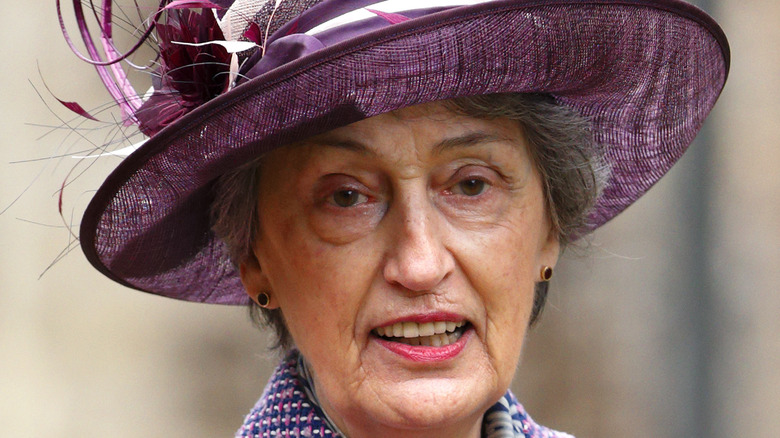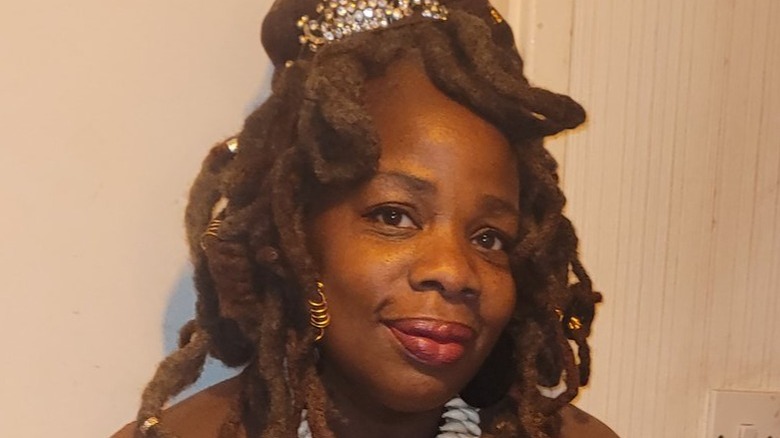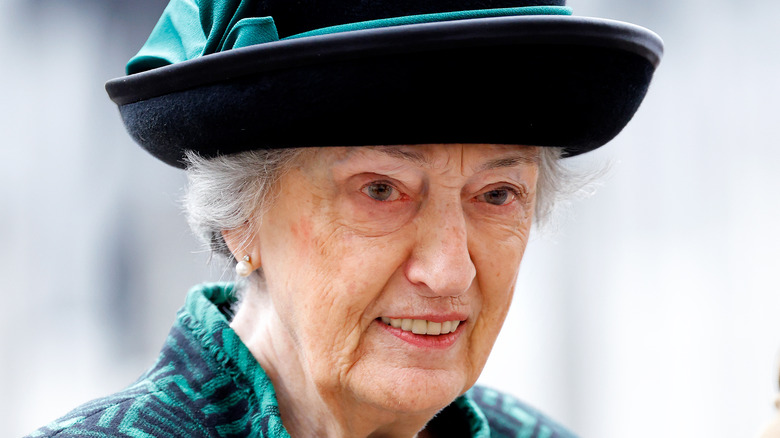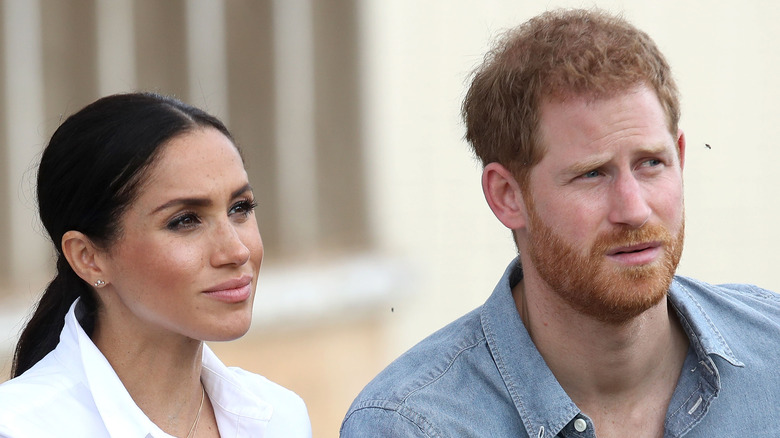The Controversial Reason Queen Elizabeth's Longtime Lady In Waiting Just Resigned From The Palace
Starting in 1960, Lady Susan Hussey stepped into the honorary position of lady-in-waiting for Queen Elizabeth II, primarily to assist with an increase in palace correspondence after Prince Andrew was born, per Tatler. Over the decades, Hussey became a key advisor to the queen, earning the nickname "Number One Head Girl." Now 83, she also forged a close bond with King Charles III, becoming Prince William's godmother.
While Hussey's service as a lady-in-waiting ended with the queen's death, Charles made her one of the "ladies of the household," according to The Times. As part of her new role, Hussey was tasked with participating in Buckingham Palace events and traveling with the royal family to important engagements like the COP 27 climate summit.
Hussey's family also has close ties to the palace. Her daughter, Lady Katharine Brooke, was recently named one of the six "Queen's Companions," per the Mirror, after Queen Consort Camilla eliminated traditional ladies-in-waiting. As reported by The Times, both mother and daughter were set to appear at a special palace event in support of victims of domestic violence — a cause that Camilla previously told British Vogue is very important to her.
While the event was Brooke's debut in her new role, unfortunately for Hussey, the reception was her last time working for the royals.
Ngozi Fulani had an unpleasant encounter at the palace event
Ngozi Fulani, who runs the London-based charity Sistah Space, was one of the guests at Queen Consort Camilla's event to celebrate organizations that help women who are victims of domestic abuse, per The Telegraph. Founded in 2015, Sistah Space assists women of "African and Caribbean heritage affected by domestic and sexual abuse."
After she arrived at Buckingham Palace, Fulani was subjected to intense questioning about her family heritage, and she recounted the interaction on Twitter. A palace staffer, whom Fulani referred to as "Lady SH," wasn't satisfied when she said she was British. Lady SH asked questions like, "No what part of Africa are YOU from?" Even after Fulani said she was born in Britain, she had to repeat herself multiple times, saying to SH, "No Lady, I am of African heritage, Caribbean descent, and British nationality."
Following the incident, Buckingham Palace released a statement saying, "In this instance unacceptable and deeply regrettable comments have been made." The palace added: "The individual concerned would like to express her profound apologies for the hurt caused and has stepped aside from her honorary role with immediate effect," per The Guardian.
"I think it is essential to acknowledge that trauma has occurred and being invited and then insulted has caused much damage," Fulani said after the event, per The Times. Despite being upset by what happened, she declined to name the person, remarking that "it is the system that needs to be revised," per The Telegraph.
Lady Susan Hussey resigned after her remarks
While Ngozi Fulani didn't identify the person who had interrogated her at Queen Consort Camilla's event, the Mirror reported that Lady Susan Hussey was responsible, with a royal source noting that she resigned.
In addition, Mandu Reid, leader of the Women's Equality Party, was also a guest at the event and confirmed Hussey's interaction with Fulani.
"Lady Susan just exited the conversation when she was done and went to speak to other people, leaving us all utterly shocked," Reid said. "We explained what we had just witnessed to the person who had accompanied us to the palace and she agreed it totally inappropriate and unacceptable and it was racist, but there wasn't a way in the moment to get any redress or recompense or complain."
Even so, Fulani was saddened to learn that Hussey resigned. "It's tragic for me that it has ended that way. I would have preferred that she had been spoken to or re-educated," she told The Guardian.
However, a spokesman for Prince William, Prince of Wales, said "it's right that the individual concerned has stepped down." As reported by Express, the spokesman stated, "Racism has no place in our society, these comments were unacceptable."
In her essay on Future Hackney, Fulani chronicled her experiences dealing with racism as a child growing up in London. "The truth is we have to be visible in order to say it's okay to be your authentic self," she writes.
Others have spoken out about experiences of racism within the palace
Unfortunately, racist comments have been associated with the royals before. During Prince Harry and Meghan Markle's bombshell interview with Oprah, the Duke and Duchess of Sussex spoke of palace preoccupations with the color of Archie's skin before he was born.
At the time, Buckingham Palace responded with the statement, "The issues raised, particularly that of race, are concerning. While some recollections may vary, they are taken very seriously and will be addressed by the family privately," per Express.
In addition, royal author and journalist Omid Scobie has detailed his own encounters within the palace concerning racism. "I myself have also had moments as a bi-racial royal correspondent within the institution," Scobie told "Good Morning America," per the Daily Mail. "I'll never forget the moment an aide, or a senior aide close to the Queen, said to me, 'I never would have expected you to speak like that.'"
In his biography of the Sussexes, "Finding Freedom," Scobie and his co-author, Carolyn Durand, also observed, "A major theme of racism in the UK centers on the question of who is authentically 'British,'" per Newsweek.
This question seems to be at the heart of Lady Susan Hussey's relentless questioning of Ngozi Fulani and her inability to accept Fulani's answer to the question of her nationality.



